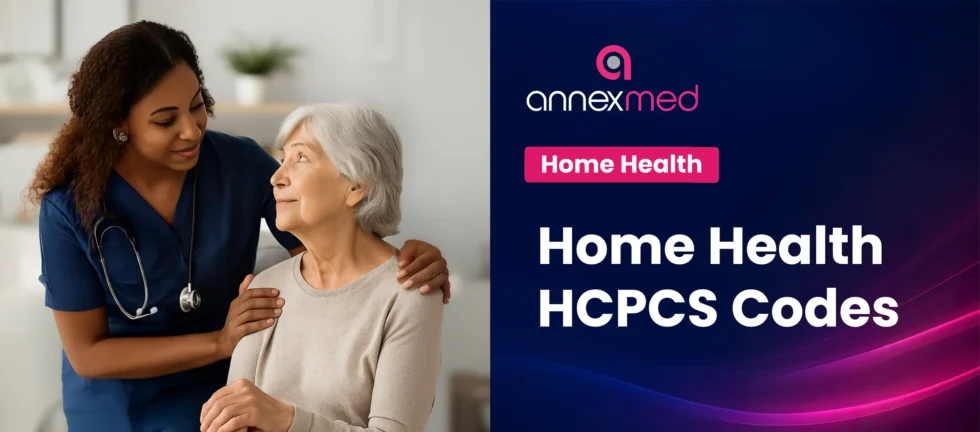Home health reimbursement depends on choosing the correct service line for the care delivered, discipline, clinician type, visit intent (restorative vs. maintenance), time, and setting must all map cleanly to the claim. When that mapping is consistent, PDGM logic behaves, edits drop, and payments land on the first pass. This guide distills the small set of Home Health HCPCS items HHAs use every day and explains how to select the right one in real-world scenarios. Use it to standardize choices across your team, reduce avoidable rework, and keep cash flow predictable.
Table of Contents
How Home Health Is Billed?
Home health agency claims are submitted on the UB-04 (TOB 032X/034X). Each claim reports HCPCS service codes, primarily G-codes, paired with the correct revenue codes, includes a 0023 HIPPS line for grouping and payment, identifies the care setting with a Q500x site-of-service code, and lists Value 61 (CBSA) along with any required value, condition, or occurrence codes. CPT generally applies to physician/APP professional claims rather than HHA facility billing, so this guide focuses on the HCPCS elements home health teams use every day.
1) Nursing & Clinical Disciplines
These lines capture who furnished the service (RN/LPN/PT/OT/SLP/aide), what was delivered (restorative vs maintenance), and how much (timed units). Accuracy here drives PDGM logic, LUPA risk, and medical-necessity validation.
| HCPCS | What it captures |
| G0299 | Direct skilled nursing by RN |
| G0300 | Direct skilled nursing by LPN |
| G0151 | PT services, each 15 min |
| G0152 | OT services, each 15 min |
| G0153 | SLP services, each 15 min |
| G0155 | Clinical social worker, each 15 min |
| G0156 | Home health aide, each 15 min |
| G0157 | PTA services, each 15 min |
| G0158 | OTA services, each 15 min |
| G0159 | PT maintenance program, each 15 min |
| G0160 | OT maintenance program, each 15 min |
| G0161 | SLP maintenance program, each 15 min |
| G0162 | RN management & evaluation of plan of care, each 15 min |
| G0493 | RN observation/assessment, each 15 min |
| G0494 | LPN observation/assessment, each 15 min |
| G0495 | RN training/education, each 15 min |
| G0496 | LPN training/education, each 15 min |
Documentation cues: Always make minutes traceable to skilled need, goals, and response. Distinguish restorative vs maintenance therapy in the note.
2) Telecommunication & Remote Collection
Use these when policy allows to document clinically necessary non–face-to-face encounters or physiologic data capture. They supplement in-person care; they don’t satisfy visit thresholds and require modality, purpose, and linkage to the plan of care.
| HCPCS | What it captures |
| G0320 | HHA services via real-time audio-video |
| G0321 | HHA services via interactive audio-only |
| G0322 | Collection of physiologic data / RPM by HHA |
These are tracking/reporting codes. They don’t replace in-person visit thresholds for PDGM/LUPA. Document clinical purpose + modality.
3) Physician/APP Codes Tied to the Home Health Plan
These are billed by the certifying/overseeing provider, not the HHA. They substantiate plan initiation, recertification, and ongoing oversight, aligning episode timing and documentation with payer requirements.
| HCPCS | What it captures |
| G0180 | Certification of HHA plan of care (initial episode) |
| G0179 | Recertification of HHA plan of care |
| G0181 | Care Plan Oversight (CPO) for patients under HHA services |
HHAs coordinate these documents; billing for them is by the physician/APP.
4) Q500x: Site-of-Service
This element declares where services occurred (home, ALF, other) and must reflect the actual setting at the time of care. Correct selection impacts payment jurisdiction, edits, and audit defensibility.
| HCPCS | Location |
| Q5001 | Patient’s home/residence |
| Q5002 | Assisted living facility |
| Q5009 | Other/Not otherwise specified location |
Using the right Q500x code is one of the simplest ways to avoid preventable edits.
5) UB-04 Companions You Can’t Ignore
These fields bind the claim together: revenue lines must align with service intent, the HIPPS line enables grouping/payment, and value/condition/occurrence codes supply geography and event context. Small mismatches here commonly trigger RTPs/denials.
Revenue codes (common for HH):
- 042X PT, 043X OT, 044X SLP
- 055X Skilled nursing, 056X Social work, 057X HHAide
- 027X/062X Medical/surgical supplies (e.g., 0623 surgical dressings)
- 060X Oxygen, 029X DME (other than rental)
- 0001 Total charges, 0023 HIPPS line
Value/Condition/Occurrence (frequent):
- Value 61 = CBSA where services provided (required on 32X)
- Condition: 20 demand denial, 21 no-pay bill, 47 HHA transfer, 54 no skilled visits (policy exception), DR disaster-related
- Occurrence: 55 date of death (pair with PDS 20)
Patient Discharge Status (commonly seen): 01, 06, 07, 20, 30, 50, 51
6) Modifiers You’ll Actually Use
Modifiers disclose who participated (e.g., assistants), why coverage criteria are met, or how medical-necessity was handled. Apply only when rules are satisfied and ensure the note explicitly supports their use to avoid recoupment.
- CQ / CO — Services furnished in whole or in part by PTA/OTA (apply per assistant rules, minutes, supervision).
- KX — Requirements/medical-necessity criteria met (use only when policy requires).
- GA / GY / GZ — ABN/medical-necessity family (apply carefully, per payer).
Assistant involvement must be obvious in the note (plan, tasks, minutes). If assistants furnished care that triggers CQ/CO, the modifier belongs on the line.
Clean-Claim Checklist
- 0023 HIPPS line present and correct
- Revenue codes align with the HCPCS service lines
- Q500x location selected correctly (home vs ALF vs other)
- Value 61 (CBSA) present and accurate
- Patient Discharge Status matches chart
- MSP screened and value codes completed when applicable
- Minutes & modality supported in notes; restorative vs maintenance clear
- CQ/CO added when assistants furnished care (and documentation supports it)
- Telecom G-codes (G0320–G0322) used only as allowed, with purpose/modality documented
Need fewer edits and faster pay?
We keep the daily fundamentals tight, correct G-codes, HIPPS mapping, Q500x/Value 61 accuracy, assistant modifiers, and MSP checks, so your claims pass the first time.
FAQs in Home Health
No. HHA facility claims on UB-04 032X or 034X report HCPCS. CPT appears on professional claims such as physician or APP billing, not on the HHA’s UB-04.
Ask three things: who furnished it (RN, LPN, PT, OT, SLP, aide), what was done (direct care, assessment or education, or maintenance), and how much time. Then map to the correct G code and revenue code.
G0299 and G0300 are direct skilled nursing by RN or LPN. G0493 through G0496 are observation or assessment or training or education by RN or LPN, reported in 15 minute units.
Use maintenance codes when the plan requires ongoing skilled involvement to maintain function or prevent decline. The note must explain why skilled maintenance is needed and what the clinician did.
Yes. If a PTA or OTA furnishes services and payer rules require disclosure, append CQ for PTA or CO for OTA. Documentation must show plan alignment, supervision, and minutes attributable to the assistant.
No. Telecommunication and remote data collection HCPCS do not satisfy in person visit thresholds. Use only when allowed and document modality and clinical purpose.






























